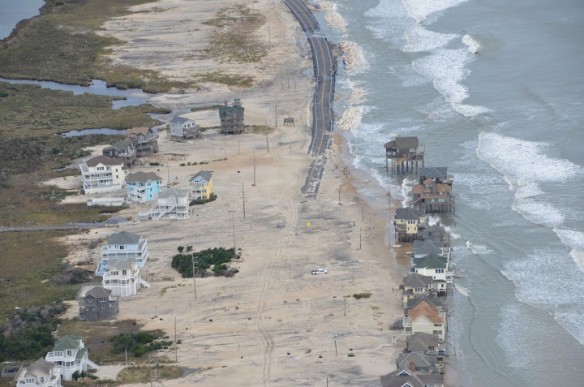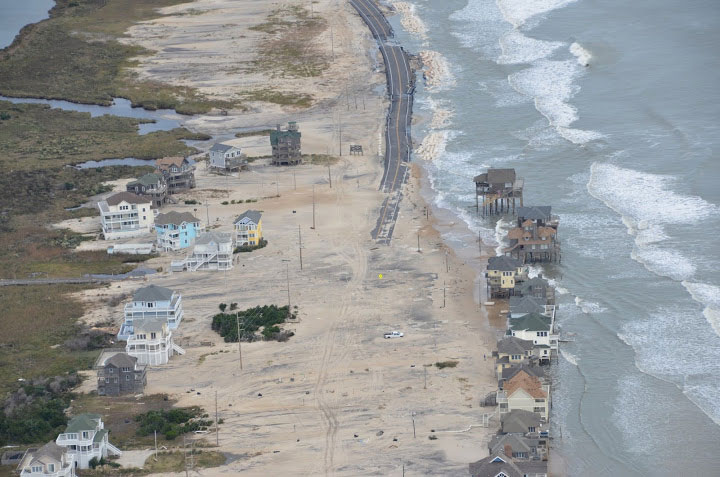
Aerial pictures of North Carolina’s coast and Highway 12, after superstorm Sandy devastated the area. Photo courtesy of: © Program for the Study of Developed Shorelines (PSDS) / WCU
Excerpts;
“There seems to be a grand misimpression that a new sea-level rise report released by the Science Panel of the Coastal Resources Commission is different from a report released in 2010.
Here’s the shocking news: They’re essentially the same. The main difference is that the Science Panel first was asked to look 90 years down the road. The new report looks 30 years down the road. Interestingly enough, the first report includes a projection for 30 years that essentially matches the 30-year projection from the new report.
Any suggestion that the political establishment somehow chastened scientists into producing a “more realistic” report is nonsense. The new report uses the same data sources, plus a few new ones, and the same approach. It even presents the predicted acceleration of sea level rise toward the middle of the century. (Full disclosure, I was an author on the first report but stepped down from the panel before the second report was completed.)
Yes, it is true that the new report includes different projections for the northern and southern North Carolina coast because northeastern North Carolina is subsiding. But the first report clearly acknowledged this difference. Why did the first report choose to use the higher northern Outer Banks rate for its SLR projection? Because the Science Panel was directed by the CRC to report only one number in that report. Had the CRC requested multiple rates, it would have gotten them.
The real lesson from this exercise is that five years of additional data haven’t changed the basic forecasts. Local officials may breathe easier having to look only 30 years down the road, but 6 to 8 inches of sea-level rise are no reason to celebrate…”
The State That ‘Outlawed Climate Change’ Accepts Latest Sea-Level Rise Report (05-05-2015)
A New Report Lays Bare the Effects of Climate Change on the N.C. Coast, IndyWeek (04-09-2015)
The data are in, and the numbers are unequivocal: the coast of North Carolina, and especially the northern part of the Outer Banks, is sinking into the sea…
Watching The Rising Tides Along North Carolina’s Coast, (11-15-2013)
Professor Robert Young, director of the Program for the Study of Developed Shorelines and a professor of coastal geology at Western Carolina University, with North Carolina Public Radio host Frank Stasio, discussing the consequences of climate change and how rising sea levels have a strong effect on the beaches of North Carolina…
“North Carolina: The Beaches Are Moving,” A Video featuring Orrin Pilkey, PhD
World famous coastal geologist Orrin H. Pilkey takes us to the beach and explains why erosion has become a problem…
Sea Level Rise Accelerating In U.S. Atlantic Coast, USGS (06-25-2012)
NOAA Establishes Tipping Points for Sea Level Rise Related Flooding, NOAA (12-18-2014)
By 2050, a majority of U.S. coastal areas are likely to be threatened by 30 or more days of flooding each year due to dramatically accelerating impacts from sea level rise, according to a new NOAA study…









